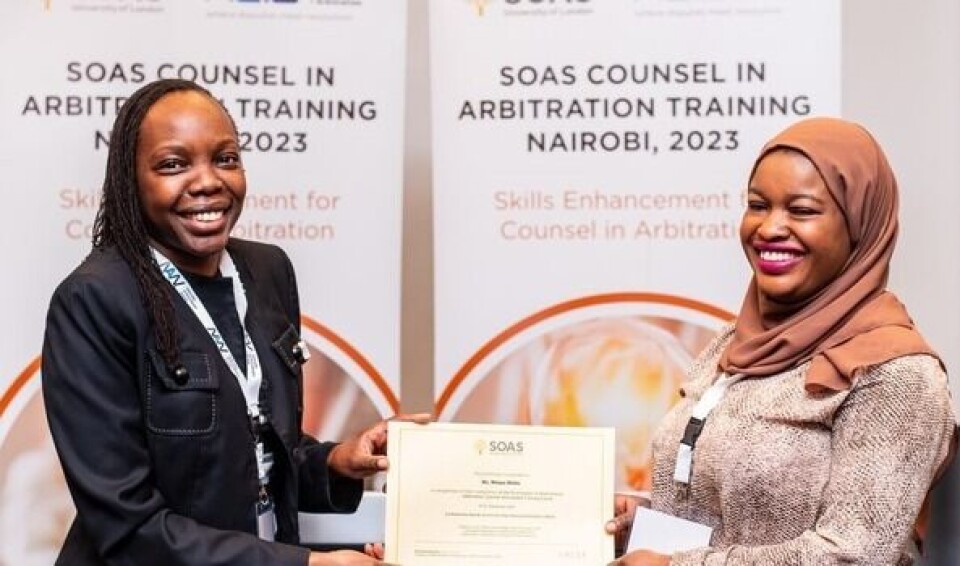Copyright : Re-publication of this article is authorised only in the following circumstances; the writer and Africa Legal are both recognised as the author and the website address www.africa-legal.com and original article link are back linked. Re-publication without both must be preauthorised by contacting editor@africa-legal.com
Upskilling arbitration counsel

With arbitration’s popularity as a dispute resolution mechanism growing each year, the SOAS University of London has undertaken a series of training workshops co-organised with African arbitral centres and organisations, aimed at upskilling counsel involved in arbitration.
The latest practical training workshop took place in Nairobi in September. “This is our eleventh counsel in arbitration advocacy skills training which was hosted by the Nairobi Centre for International Arbitration during the same week as the inaugural Nairobi Arbitration Week,” said Emilia Onyema, a law professor at SOAS University of London and an international arbitrator. “We again saw the transformation of the skills of the participants over the three days which speaks to the relevance of this training which we are very proud to deliver with our partners in Africa.”
In a blog post, Onyema explained that participants worked from a case study prepared by the SOAS team. “Over the course of three days, participants made written and oral submissions before panels of three individuals who practise as international arbitrators. The submissions focused on case theory and opening submissions, examination of witnesses and closing submissions and were made in-person at each location.”
Onyema says the feedback from some respondents to their 2018 SOAS arbitration in Africa survey was that Africans are not as well represented in international arbitration as counsel and arbitrators when compared with their participation as parties. “In relation to counsel, capacity deficit was mentioned as one reason for the poor representation.”
Many training programs in arbitration do not focus on the provision of skills-based training for counsel who represent parties before the arbitral tribunal. This is worrying because the final outcomes of cases may be heavily impacted by the quality and ability of counsel in the arbitration. Onyema says this informed the design of the SOAS Counsel in Arbitration training as skills-based.
“The success of the delivery model adopted in the SOAS training is the co-learning element which also gives the participants the opportunity to demonstrate the skills they have learned and receive immediate feedback,” Onyema explained.
“At SOAS, our arbitration team does not just look at inclusivity as a one-sided coin (appoint or work with Africans) but as a double-sided coin in which we actively support the preparation of our African colleagues to excel in their domestic practices and, when the opportunity presents itself, in their international practice as well. In this way, we contribute to the elimination of some of the biases preventing the opening of the field of arbitration to all those qualified to participate,” Onyema concluded.
One of the participants at the Nairobi training workshop, Nimo Adan, commented that “The role-playing exercise was effective in fostering a collaborative learning environment and it enriched my understanding of the arbitration processes and the various applicable techniques. The trainers’ expertise, coupled with the interactive sessions, contributed significantly to my learning journey,” she said.
Another participant, Caroline Oshuru Oyula, said, “The training has greatly improved my advocacy skills as counsel representing different parties in different arbitral claims. A big thank you to the organisers and to all the trainers who were concise and practical in their approach and gave us valuable feedback.”
John M. Ohaga, Managing Partner at TripleOKLaw Advocates, was one of the trainers. “I think the best thing about teaching is that you learn so much! The training was intensive and interesting because I find that each cohort of practitioners in the different jurisdictions that I have now taught in has such a different approach to learning and that exposes how important cultural differences can affect our understanding of issues,” he noted.
The next SOAS arbitration workshop, and the last for 2023, will be held in Tunis from 20-22 November and will be run in French.
The 2022 SOAS Arbitration in Africa Survey Report can be downloaded here.
The Ninth SOAS Arbitration in Africa annual conference will be held at the University of Cape Town on 11 October 2023. For further information click here.
To join Africa Legal's mailing list please click here
